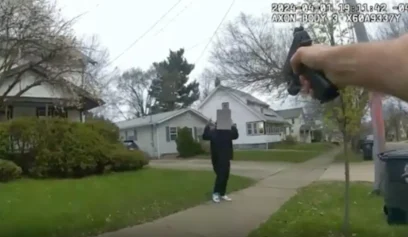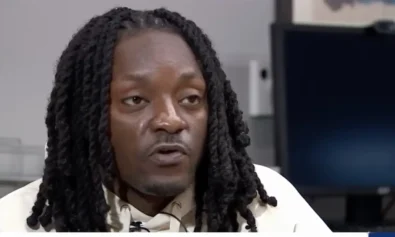Media and social media outlets are buzzing with the revelation by New York Times columnist Charles Blow that his son Tahj, a junior at Yale, was accosted on Saturday by campus police, who pointed a gun at him and made him lie down face first on the sidewalk because police said he fit the description of a robbery suspect.
The case illustrated for many who still doubt it that the threat to young African-American males from law enforcement is not limited to just poor kids in poor neighborhoods—it can happen anywhere to any young person, no matter the family’s prominence or income level.
“I am reminded of what I have always known, but what some would choose to deny: that there is no way to work your way out—earn your way out—of this sort of crisis,” Blow wrote in his column today. “In these moments, what you’ve done matters less than how you look. There is no amount of respectability that can bend a gun’s barrel. All of our boys are bound together.”
In an unusually detailed response, Yale issued a statement saying the case is under investigation.
“Earlier this evening, Yale police responded to emergency calls from undergraduates in Trumbull College, one of twelve residential colleges on the Yale campus. Several students reported that an individual had just entered their rooms under false pretenses, pretending to be looking for someone. Students in Trumbull College have been the victims of burglary this week, and a person matching the physical description of the individual, as well as the story of ‘looking for someone’ has been seen several times in the college. (See this report from the Yale Daily News.)
“Tonight, when students spotted him, they called police and described him as a tall, African-American, college-aged student wearing a black jacket and a red and white hat. This was the description that Yale police used as they converged on Trumbull and attempted to track down the suspect. During the efforts to locate and detain the suspect, a Yale College student, who closely matched the description of the suspect, was briefly detained and released by Yale police. The suspect, who was seen fleeing Trumbull College, was arrested shortly thereafter in Berkeley College (a residential college adjacent to Trumbull College) and will be charged with felony burglaries.
“An internal review of the incident will be conducted by the YPD Chief’s office.”
Though many of the media stories on the incident had the tone of shock that such an encounter could happen on a prestigious campus like Yale, it immediately brought me back to my years as a student on the Yale campus in the 1980s, when I would regularly get an evening escort back to my dorm room from campus police, following closely behind me in a squad car, making sure this young Black male was not a trespasser on campus up to no good.
At first it was incredibly unsettling, knowing that any false move by me or mistaken assumption by police could result in my name in tragic headlines. But eventually I actually got somewhat used to it—though at times my mind would play tricks on me and I’d start wondering what would happen if I suddenly started running. The mind can take you on bizarre trips in the midst of such stress.
Yale University is surrounded by a relatively poor Black neighborhood in New Haven, so there was always a hint of racial tension hovering over the campus, at least for the Black students, during my years there. The incident with Blow’s son tells me things haven’t much changed in the last three decades.
Many Black male Yale students over the years, including myself, could tell stories about being refused entry into one of the residential colleges at night by white undergraduates asking for identification before they opened the gate. Once you produced the ID, the white students would smile nervously and try to make small talk in an attempt to show they were just being safe, not racist—and all the while you’d be thinking, “But dude, I’m in your English class.”
In his column, Blow published his son’s recounting of the Saturday encounter, which started with the student, a junior, seeing an officer “jogging” toward the entrance of another building.
“I faced forward again, presuming that the officer was not talking to me. I then heard him say, ‘Hey, turn around!’ — which I did.
“The officer raised his gun at me, and told me to get on the ground.
“At this point, I stopped looking directly at the officer, and looked down towards the pavement. I dropped to my knees first, with my hands raised, then laid down on my stomach.
“The officer asked me what my name was. I gave him my name.
“The officer asked me what school I went to. I told him Yale University.
“At this point, the officer told me to get up.”
The officer gave his name, then asked my son to “give him a call the next day.” …
“I got up slowly, and continued to walk back to my room. I was scared. My legs were shaking slightly. After a few more paces, the officer said, ‘Hey, my man. Can you step off to the side?’ I did.”
The officer asked him to turn around so he could see the back of his jacket. He asked his name again, then, finally, asked to see my son’s ID. My son produced his school ID from his wallet.
The officer asked more questions, and my son answered. All the while the officer was relaying this information to someone over his radio.
My son heard someone on the radio say back to the officer “something to the effect of: ‘Keep him there until we get this sorted out.’ ” The officer told my son that an incident report would be filed, and then he walked away.
Blow wrote that his son was “shaken up” and Blow was “fuming.”
“Now, don’t get me wrong: If indeed my son matched the description of a suspect, I would have had no problem with him being questioned appropriately,” he wrote. “School is his community, his home away from home, and he would have appreciated reasonable efforts to keep it safe. The stop is not the problem; the method of the stop is the problem.
“What if my son had panicked under the stress, having never had a gun pointed at him before, and made what the officer considered a “suspicious” movement? Had I come close to losing him? Triggers cannot be unpulled. Bullets cannot be called back.”
The incident had a fortunate ending, but it serves as a chilling reminder for young Black males and their parents that danger could be lurking around every corner—or on a seemingly safe college campus.



